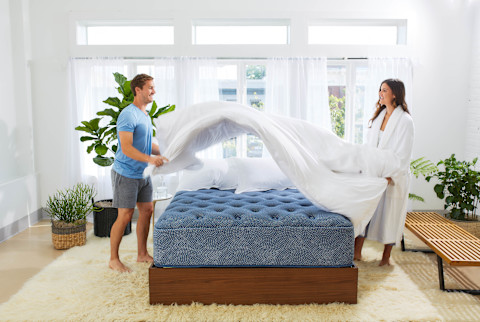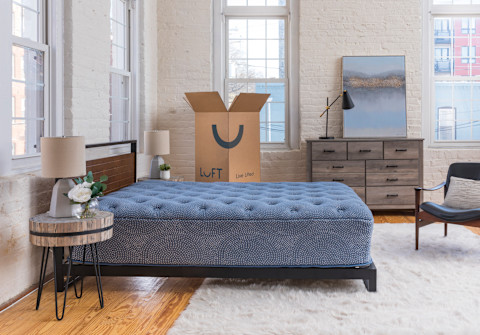You Asked Us Your 3 Biggest Questions About Sleep (And A Top Expert Clears Up The Answers)

Sleep is a big topic here at mbg. (Remember when we devoted an entire week to learning more about it?) And not surprisingly, since the quality of our sleep is so interwoven and connected to all other aspects of our daily life and well-being, we get asked certain questions over and over again.
To help answer three of the most common ones, we turned to Deborah Sewitch, Ph.D., CPC, a sleep researcher, educator, and scientific reviewer who has authored over 50 articles on sleep in peer-reviewed scientific journals and held faculty appointments at four medical schools including Yale University and the University of Pennsylvania. Read on for some helpful expert tips to feel more well rested—starting tomorrow:
Is napping a healthy habit?
The short answer? Naps can have healthy benefits: You already know how refreshing it feels to take one, and studies have proved that a quick afternoon snooze can improve performance1, alertness, and the brain's capacity to learn. On top of that, new research now shows a link between napping and lower rates of heart disease.
But here's the thing about dozing off during the day: Experts like Sewitch say it's a signal that you're functioning on a sleep deficit—the key piece to know if you're constantly craving a nap. "The fact that you need a nap or want to take one is because you're probably not getting enough sleep at night," Sewitch says.
Chalk it up to work's busy season, a new baby, or hundreds of slumber-disrupting health conditions—if you know you're getting less than the recommended amount of sleep, which is seven to eight hours each night, a nap can be very helpful in catching up on the rest your body needs. But there's a right time and way to do it. (And definitely do it if you can! If you need a nap and aren't able to take one, "you're not going to be functioning at the top of your game or anywhere near it," Sewitch adds.)
The healthiest way to nap if you need one: Our circadian rhythm naturally dips in the afternoon between 2 and 4 p.m.—the best time of day for a quick snooze. Set your phone alarm: "Your nap time should be under 20 minutes—ideally 10 to 15 minutes at most," says Sewitch. "Otherwise you can go into deeper stages of sleep, making it harder to wake up and more likely that you'll feel groggy. You can even take two naps at different times between 2 and 4 p.m.—the important thing is to keep it short!"
On the flip side, if you're not sleep-deprived and catching 15 minutes of zzz's on your bed sounds like a lovely way to spend a free afternoon, there's no harm in going for it.
Can my bed mess with the quality of sleep?
"Absolutely!" says Sewitch. We spend a third of our lives sleeping, so "your bed is an important piece of your life, which directly affects the quality of your life. We often spend so much money on our devices and other areas of our health and wellness—it's a smart idea to invest money into your mattress, too."
Your bed is an important piece of your life, which directly affects the quality of your life.
How to pick the right mattress for you. Beds are not one-size-fits-all, so first, pick a company that will deliver the mattress to your door, let you sleep on it for a period of time, and will pick it up with a full refund if it's not your best sleep ever. Luft, a clean mattress company that's been making safe, nontoxic mattresses for 60 years, will let you sleep on whichever mattress you choose risk-free for 100 nights. Look for a mattress that will help keep you cool while you sleep, support your body type and sleep position, and won't add toxins to the air you breathe inside your home.
Luft mattresses are made with locally sourced materials and the latest technology to regulate your body temperature, keep you and your family safe (all their beds are CertiPur® certified, meaning you won't be breathing in any ozone depleters, flame retardants, heavy metals, or formaldehyde here), and support your sleep position.
If you're a side, back, or stomach sleeper, for instance, or if you want to ease hip, shoulder, or joint pain, Luft's Luxury Firm Multi Sleeper is created with five specially designed layers to provide soothing comfort and contoured support with the proper balance of softness and firmness. For the rest of the fam, the Little Luft is actually designed for growing bodies who need healthful sleep just as much as you do—but who also love to jump around on their bed, so Luft accounted for durability, too.

Find a Luft mattress for your needs and use these codes below to save on your purchase:
<strong>· </strong>Use <strong>Code MBG400</strong> for $400 off a Cal King, King, or Queen Luft Mattress<br><strong>· </strong>Use <strong>Code MBG225</strong> for $225 off a Twin XL, Twin, or Full Luft Mattress<br><strong>· </strong>Use <strong>Code MBGLL100</strong> for $100 off a Little Luft <br><strong>· </strong>Use <strong>Code MBG30 </strong>for 30% off accessories
Why do I wake up feeling so tired, even if I've slept a full night's rest?
So you've made it to bed at a decent time, but waking up still feels like the hardest thing you'll do all day. What gives?
You're waking up during a deep sleep cycle. Your morning alarm should feel like less of a struggle fest when you wake up during your lightest sleep cycles (a REM stage or stage 2). Many smartphone apps and fitness trackers can monitor signals from your body while you sleep and wake you up softly when you are in the lightest possible sleep stage.
Your body clock needs sleep to be an anchor for all its other rhythms.
Your circadian rhythm is out of whack. Traveling to a different time zone, jet lag, staying up late at night to work, the chaotic holiday season—these can all confuse your internal sleep/wake cycle and throw it off balance. But normally, "Are you going to bed at a regular schedule, and are you sticking to that regular schedule?" asks Sewitch. She recommends keeping a sleep diary to determine whether a fluctuating bedtime is causing you to wake up feeling tired. "Your body clock needs sleep to be an anchor for all its other rhythms," she says. "A stable sleep schedule over time keeps your internal clock balanced between sleep and wakefulness."
Your job isn't jibing with your natural sleep schedule. According to Sewitch, night owls and early birds (or larks, as she calls them) are a real thing. "If you're waking up tired after seven, eight hours of sleep, there could be a mismatch between your work schedule and the timing of your natural sleep schedule, which is when you feel most alert and comfortable," she says. "Night owls usually don't fall asleep until midnight or later, while larks are up and at 'em at 5 or 6 a.m., so if you've taken a job that doesn't jibe with your sleep personality and is in counterbalance to that clock, that may be a problem." If you find that this is affecting your work performance, open up a convo with your boss. And who knows—nap rooms may be a standard office perk in the near future.
